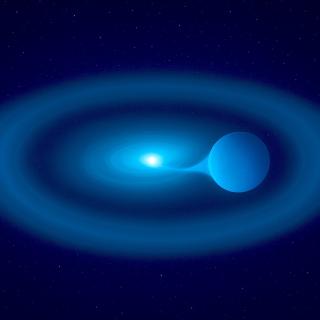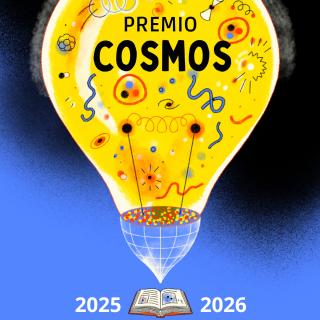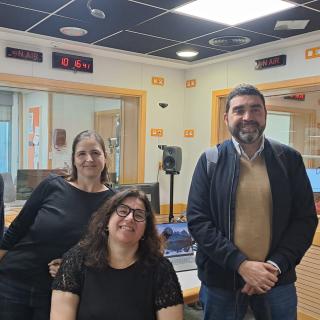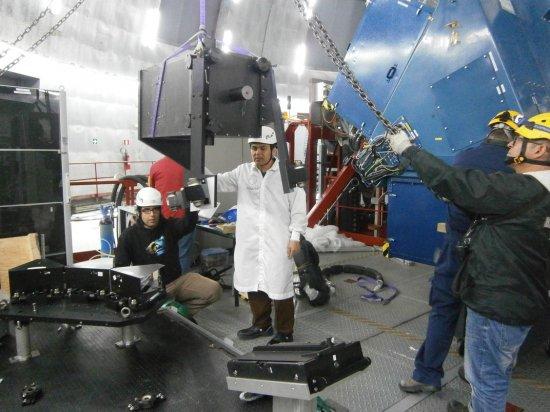It may interest you
-
 A greedy white dwarf star in our own Milky Way galaxy is devouring its closest celestial companion at a rate never seen before, according to an international study involving the Instituto de Astrofisica de Canarias (IAC) and the University of La Laguna (ULL). The research, published in the journal Monthly Notices of the Royal Astronomical Society , found the double star, named V Sagittae, is burning unusually bright as the super-dense white dwarf is gorging on its larger twin in a feeding frenzy. Experts think the stars are locked in an "extraterrestrial tango" as they orbit each other everyAdvertised on
A greedy white dwarf star in our own Milky Way galaxy is devouring its closest celestial companion at a rate never seen before, according to an international study involving the Instituto de Astrofisica de Canarias (IAC) and the University of La Laguna (ULL). The research, published in the journal Monthly Notices of the Royal Astronomical Society , found the double star, named V Sagittae, is burning unusually bright as the super-dense white dwarf is gorging on its larger twin in a feeding frenzy. Experts think the stars are locked in an "extraterrestrial tango" as they orbit each other everyAdvertised on -
 El Instituto de Astrofísica de Canarias (IAC) organiza el Premio Cosmos, un proyecto educativo internacional que llega por primera vez a España desde Canarias, con la colaboración del Área STEAM de la Consejería de Educación, Formación Profesional, Actividad Física y Deportes, y el patrocinio de la Fundación CajaCanarias, así como el apoyo de la Real Academia de las Ciencias de Canarias. Con varias ediciones consolidadas en Italia, Francia y Países Bajos, el Premio Cosmos tiene como misión impulsar la cultura científica, despertar vocaciones y celebrar la mejor literatura de divulgación enAdvertised on
El Instituto de Astrofísica de Canarias (IAC) organiza el Premio Cosmos, un proyecto educativo internacional que llega por primera vez a España desde Canarias, con la colaboración del Área STEAM de la Consejería de Educación, Formación Profesional, Actividad Física y Deportes, y el patrocinio de la Fundación CajaCanarias, así como el apoyo de la Real Academia de las Ciencias de Canarias. Con varias ediciones consolidadas en Italia, Francia y Países Bajos, el Premio Cosmos tiene como misión impulsar la cultura científica, despertar vocaciones y celebrar la mejor literatura de divulgación enAdvertised on -
 El Instituto de Astrofísica de Canarias (IAC) emitió este jueves, 26 de febrero, a las 22:30 horas, su espacio radiofónico ‘Soñando Estrellas’ en La Radio Canaria. Este programa semanal de 30 minutos, conducido por Verónica Martín y ya disponible en iVoox , nace para divulgar la labor de los más de 400 profesionales del centro y rendir homenaje a la visión de Francisco Sánchez , fundador del IAC. El programa de esta semana contó con una entrevista a Enrique Pérez , investigador y divulgador del Instituto de Astrofísica de Andalucía y del Consejo Superior de Investigaciones CientíficasAdvertised on
El Instituto de Astrofísica de Canarias (IAC) emitió este jueves, 26 de febrero, a las 22:30 horas, su espacio radiofónico ‘Soñando Estrellas’ en La Radio Canaria. Este programa semanal de 30 minutos, conducido por Verónica Martín y ya disponible en iVoox , nace para divulgar la labor de los más de 400 profesionales del centro y rendir homenaje a la visión de Francisco Sánchez , fundador del IAC. El programa de esta semana contó con una entrevista a Enrique Pérez , investigador y divulgador del Instituto de Astrofísica de Andalucía y del Consejo Superior de Investigaciones CientíficasAdvertised on
